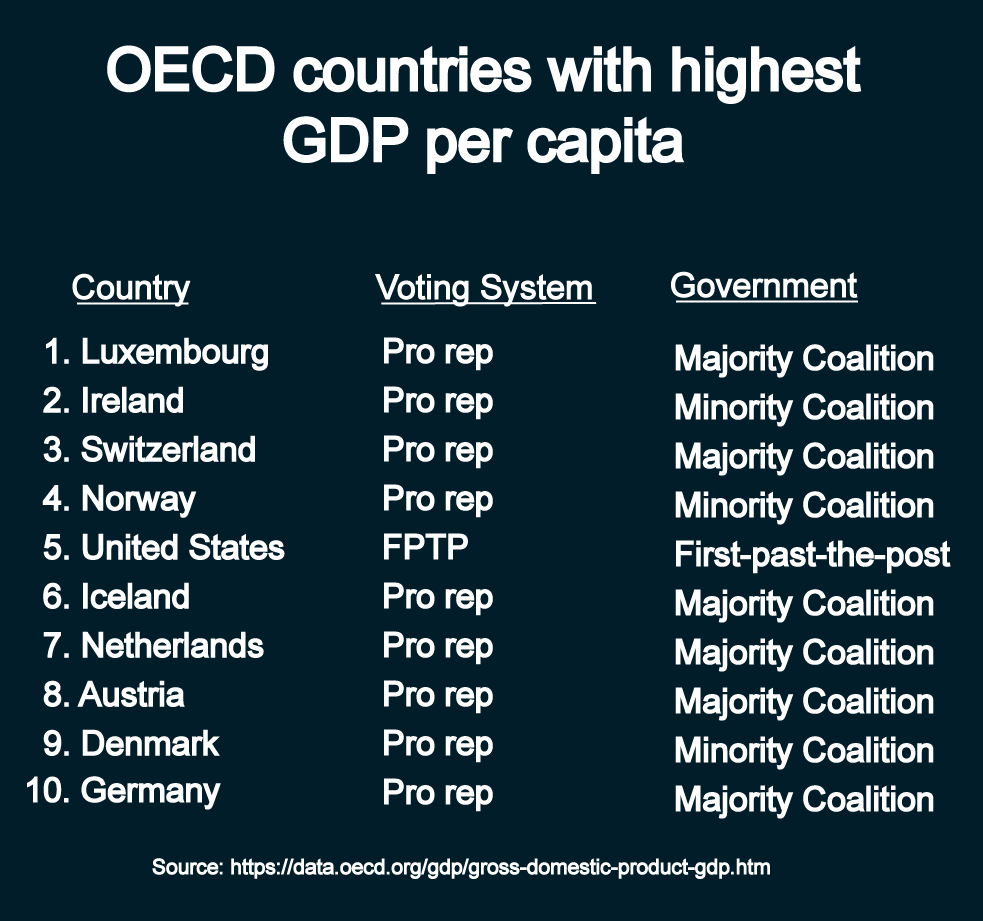Editorial: Our Choice of Voting Systems -- Part Eight.
There are large, loud and expensive ads urging people to vote against Proportional Representation in this fall’s referendum. Are the points made in those ads valid?
As citizens, or even just as residents, we should all care deeply about how well our government serves the public interest. We need to get it right when we choose whether or not to change our electoral system – so we need to consider the arguments made by both sides. In this section, we’ll examine more of the arguments raised by opponents of Proportional Representation (ProRep).
What about accountability?
One of the lines in materials from the “No to ProRep” side of the debate claims that ProRep would “empower party bosses and make government less accountable.” First, what do they mean by “accountability”? Is a governing party accountable to the electorate as a whole, or just to the voters who voted for that party? How can a governing party be “held accountable” – aside from finger-pointing and blaming, what IS “being held accountable” in terms of government under our current system , anyway? How do we “hold the government accountable” now, under First-Past-the-Post (FPTP)? Well, we vote them out if we don’t like what they’ve done. And that results in what’s called “policy lurch” or “the pendulum effect.”
If we want to know which MLAs, of which parties, voted for or against a bill, it’s all a matter of public record and available on-line, as is every word spoken in debate. That won’t change with ProRep, so it will be just as easy as ever to assign responsibility for decisions in the Legislature. If we don’t like how a representative or a party has conducted itself, we can still wield our votes in the next election. One of the points in favour of ProRep is that votes will be more effective and more accurate in determining representation.
With ProRep, it seems likely that there will be less blame to go around anyway, because when the parties must work together to accomplish legislation, more of the voters are likely to approve of the results.
“Empower party bosses”? I would really appreciate a detailed explanation of how anyone thinks it could do that, because it seems to me that ProRep is much, much more likely to limit the power of party “bosses” (whoever they are) because no party is as likely to win a resounding majority of the seats unless they get a resounding majority of the votes, so they will be forced to work with other parties to accomplish changes. That empowers citizens — not political parties.
And that’s a good thing, because ProRep would mean the end of any party with a minority of voters’ support acting unilaterally to change things to suit that party’s corporate or union supporters (or bosses).
As for those “bosses” – if that reference is to the corporate entities that historically have exerted so much influence over governing parties, it’s likely that a coalition would be harder to lobby. Legislation eliminating corporate donations to political parties will go a long way toward minimizing corruption in government.
Opposition from some of the Business Sector?
The Rossland Telegraph belongs to the local Chamber of Commerce. One of the things the Chamber does is to collect the opinions of Chamber members on issues, province-wide. There was a recent survey on the issue of electoral reform. When I saw the results of the survey, I was surprised to see that a majority of the respondents were opposed to ProRep. Why is that? I am genuinely puzzled, and wish one of ProRep’s opponents could explain their reasons for fearing a proportional system.
Unless those reasons have nothing to do with the public good. Some parties, some MLAs, some businesses may not favour government supported by an actual majority of voters, because it may not favour their own personal or economic agenda over the public good. In that case, they and their attempts at misdirection have no sympathy from me.
One of the reasons I am so puzzled about opposition from the business sector is that countries operating with a ProRep electoral system tend to do very well economically — which ought to be good for businesses — as well as being, in general, just slightly ahead of the pack socially and environmentally. So, what’s not to like?
Here’s some data from the OECD:

Writer Douglas Todd, in a March 19, 2018 article in the Vancouver Sun, stated that “Coalition governments across Europe and elsewhere have been far more effective than any Canadian government in bringing in progressive legislation, whether to do with economic equality or the environment.”
These statements are backed up by the extensive studies done by Arend Lijphart and explained in his book “Patterns of Democracy.” Yet the Independent Contractors and Businesses Association of BC is touting “our current, simple system” and advertising with arguably false statements about ProRep, such as this doozie: “Who forms government will always be decided by extreme fringe parties that don’t represent mainstream views.” This statement is set on a bright green background, which could lead readers to believe that the ICBA considers the Green Party to be an “extreme fringe party” – notwithstanding that in the last BC election, Green candidates won 16.84% of the votes cast – a respectable tally.
At one point, Martin Luther King’s views were considered by many to be “extreme” and “fringe.” At one point, suffragettes – women seeking the vote for women – were considered extreme and fringey, and in fact some suffragettes did get extreme and resort to violence when their demands for the right to vote were dismissed too often by the men in power. That was extreme; we should remember that systemic oppression of any group incubates extremism.
Another amusing but misleading statement by the ICBA is, “some politicians will not be accountable to any group of voters, but chosen by party bosses.” This is set against an angry red background picture of a fat, pugnacious-looking guy with a big cigar jutting out of his face. (There’s that “party bosses” thing again.)
In my opinion, there is no evidence at all that any MLA would not be accountable to the voters in her or his district under a ProRep system. That statement is unfounded scare-mongering. Under our current system, many MLAs seem to be “not accountable” to the voters – because often a majority of voters in their districts did not vote for them.
Another false assertion in the ICBA’s materials is a statement that combining two electoral districts (each of which currently has one MLA) into one large electoral district which would have two MLAs would mean that we voters in these large districts would “lose [our] local voice.” Fact: there would still be just as many MLAs per capita in rural areas – perhaps even more – and at least one MLA would be elected by the ICBA’s favourite simple system – FPTP. Also, “list” seats would be assigned by region, based on voter preferences, to ensure local voices.
The ICBA materials also make assertions that ProRep would result in “back-room deals.” Maybe they're talking about the different parties having to discuss and negotiate with each other to reach agreement on changes in legislation, instead of just throwing invective at each other while the government with a majority of seats from a minority of votes does whatever it pleases.
I think it would be more difficult under ProRep for “party bosses” to push through the usual “back-room deals” with corporations or other powerful lobby groups, which may be why the ICBA objects to the idea.
Another piece of anti-ProRep propaganda says, “We’re only having this referendum because some politicians want to make it easier to win elections.” On the contrary: if “winning” an election means gaining a majority of the seats with a minority of the votes, ProRep will make that not just harder, but impossible.
ProRep will make it easier for the vast majority of voters to have an effective voice in the Legislature; it will make it harder for a minority to shut out all other voices. It will stop our governance from being based on a “single story” about the people of BC and what we want, about what’s best for business in BC, about what we need to do about climate change, and so on.
Those who oppose ProRep are telling a “single story” about it, and like most single stories, it is simplistic and wrong.
To watch an enjoyable and thought-provoking TED Talk about the danger of the “single story,” click the link below:
Here ends Part Eight. Discussion will continue in Part Nine.
























